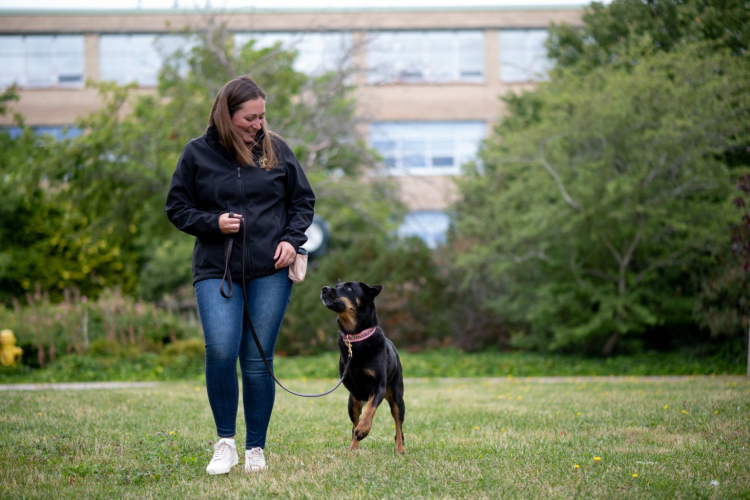Research led by Memorial University is among the first to provide evidence of a link between the gut microbiome and behaviour in pet dogs.
Findings from the study, led by Sarita Pellowe, a two-time graduate of the Faculty of Science, along with a trio of researchers, were recently published in the peer-reviewed open-access journal, Scientific Reports.
"Although we need a clinical trial before being able to recommend specific treatments, this research highlights that the gut and gut health are closely linked to behaviour," said Ms. Pellowe, who graduated last fall with a master of science degree in cognitive and behavioural ecology and as a fellow of the School of Graduate Studies. "Pet owners will benefit from being aware of their dog's gut health, and that there may be more treatments becoming accessible as this area of research continues to grow."
As part of their work, the researchers paired up with dog owners to assess their pet's behaviour.
Multi-disciplinary approach
Historically, Ms. Pellowe says behavioural issues have often been viewed as a training issue. She says more advances in knowledge may be able to help address some behavourial problems.

Memorial researcher Sarita Pellowe says pet owners will benefit from being aware of their dog's gut health, and that there may be more treatments on the horizon. Photo: Rich Blenkinsopp
The research was multidisciplinary, bringing together areas such as psychology, ecology, microbiology and bioinformatics.
Her supervisors were Drs. Dawn Bignell, Department of Biology; Carolyn Walsh, Department of Psychology; and Lourdes Peña-Castillo, Departments of Biology and Computer Science.
"We consistently found that the bacterial genus, Blautia, was associated with dogs that scored higher for anxiety on the Canine Behaviour and Research Questionnaire," explained Ms. Pellowe.
'Critical' insight
As part of its work, the team characterized the types of bacteria that are present in the guts of dogs exhibiting different degrees of anxiety or aggression by sequencing microbial DNA extracted from dog fecal samples.
"Behavioral disorders such as anxiety have a negative impact on the health and welfare of companion dogs and are known to increase the chances of dogs being relinquished to shelters," said Dr. Bignell.
Notably, she says anxiety-like behaviours are common in companion dogs, with some studies finding that up to 72 per cent of dogs exhibit some form of anxiety.
"Understanding the role of the gut microbiome in canine behaviour is critical, as this information could eventually facilitate the development of new treatments to reduce the impact of behaviour disorders on dogs and their human families."
Rewarding experience
For Ms. Pellowe, she was in the right place at the right time to work on the project.
Originally from Blackpool, England, she moved to Newfoundland and Labrador in 2012 to complete a master's degree in biology in the Department of Ocean Sciences.
An avid animal lover, she has worked as a certified dog trainer and behaviour consultant since 2017.
"We are always looking for ways to better help our furry friends to overcome their issues." Sarita Pellowe
During the early days of the COVID-19 pandemic, her supervisors came up with the idea of examining the connection between gut microbiota composition and its relationship to anxiety and aggression.
That is when they found Ms. Pellowe.
"With the stress and unpredictability of COVID lockdowns, it seemed like a great time to revisit grad school," she noted. "This master's degree was a required component for me to apply to become a board-certified animal behaviourist. I am currently the only one in Newfoundland."
She says the research is "incredibly rewarding" as it may offer solutions for pets and their owners.
"In my work, we are always looking for ways to better help our furry friends to overcome their issues and remain with their families. I was very excited not only to learn more about the role of gut health in dog behaviour, but also contribute to a growing area of research that may help dogs facing issues with anxiety and aggression."
With the new insight, Dr. Bignell says the Memorial team is hoping to expand its work.
"We hope to eventually be able to investigate whether probiotic supplements can have a positive effect on anxiety-like behaviours in companion dogs."
The research study was funded in part by Memorial's Seed, Bridge Multidisciplinary Fund, along with the MITACS eAccelerate program for entrepreneurs.
Learn more about research at Memorial and check out Research Strategy 2023-28 to learn how we're moving ideas forward.













